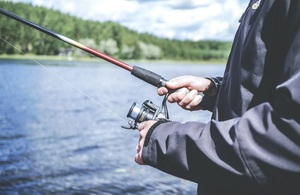Environment Agency delivers £1.3 million boost to England’s fisheries
The EA's Fisheries Improvement Programme has invested in 170 projects over 12 months to boost fish stocks, improve facilities and accessibility for anglers.

The EA has invested over £1.3m in fisheries and improving angling services.
The Environment Agency’s Fisheries Improvement Programme (FIP) has invested £1.3 million in projects across England to benefit anglers, deliver improvements to vital habitats, increase fish stocks and improve accessibility to ensure the sport is as inclusive as possible.
Every penny the Environment Agency receives in fishing licence income is reinvested to protect both the sport of angling and England’s waterways. In the last 12 months alone, alongside partners, the FIP has delivered more than 170 completed projects across England.
The FIP funding is matched by local partners including angling clubs and fisheries. The EA has also worked closely with local rivers trusts and the Wild Trout Trust. The total match funding, made up of additional cash and in-kind contributions, is estimated to be more than £3.2 million which continues to have a positive impact on local communities, angling and ecology.
In Devon and Cornwall, £64,000 was used to support nine projects ranging from habitat improvement for wild native trout, enabling access to fishing for people with disabilities and working with small coarse fisheries to improve the facilities for their members.
In Essex, a new fishery has been developed for military veterans suffering from post-traumatic stress disorder. Here, the Environment Agency is working in partnership with iCarp to establish and revamp Lifted Lakes near Harwich. The venue is intended to be used as a base for treatment and future mental health research. A £10,000 FIP grant was used to enhance the environment for fish and refurbish angling platforms and facilities.
Heidi Stone, Environment Agency Fisheries Manager said:
All of the projects we fund must demonstrate benefits for anglers. The Fisheries Improvement Programme allows us to identify and invest in work supporting a local, sustainable future for angling.
The programme is also a great demonstration of our partnership efforts, with many of the projects completed with the support of landowners, local businesses and fisheries clubs – it’s a real team effort! The more people who go fishing, the more we can invest.
In the last 12 months alone, alongside partners, the FIP has delivered more than 170 completed projects across England. The programme covers rivers and stillwaters and will benefit coarse fish, trout and eels.
Looking forward, the Environment Agency wants to hear from more clubs and fisheries about the work and projects they would like to see undertaken.
Further examples of FIP projects completed in 2020/21 include:
Ranby House on the Humber
A £1,600 investment has improved local fishing facilities for schoolchildren at Ranby House. In 2019, the fishing pond was nothing more than a small overgrown flooded area which was unsuitable for the school children to explore safely, let alone fish. The pond has now been partially de-silted and deepened, with overgrowth removed and managed. Dipping and angling platforms have also been installed and the pond has been stocked with fish from the Agency’s Calverton Fish Farm.
Thanks to the FIP, the pupils will now be able to learn to fish as part of their curriculum and develop a meaningful connection with nature. They will also learn how to recognise the various aquatic life living in the water.
River Great Ouse, Cambridgeshire
£15,000 was used on a backwater enhancement project on the river Great Ouse at Eaton Ford on the lower section. In partnership with St Neots Angling society, Huntingdonshire district council and St Neots Town Council, the work involved removing silt which increased the depth of the channel, clearing plants which were making it impossible for anglers to fish, the installation of several fishing platforms and the removal of fallen branches from trees to improve accessibility for fishing. The silt removed was also used to re-profile the bank, making it stronger, and it was also re-seeded with wild flower mix to benefit pollinators.
A further £8,000 was used to deliver improvements on the Ouse as part of a project in partnership with Luton Angling Club. The stretch of the Ouse had previously been difficult for members of Luton Angling Club with mobility impairments to access. Work was carried out to enhance habitat on the river by removing over-grown willow which grows rapidly and causes accessibility issues for anglers. Silt was also removed from the backwater to deepen the area for fish and to provide better fishing conditions and safer access.
Walton Hall Park Lake, Liverpool
Using FIP funding, a project was undertaken on an urban fishery to improve historically poor water quality. To preserve and enhance this angling resource and to return the lake to its former glory, habitat improvements were made. These included floating islands, duck platforms and fish refuges to provide shade and refuge for fish from predators and help to regulate water temperatures. Vegetation bays were also used to provide cover, food for fish and fry and contribute positively to water quality. Equipment was provided for volunteers to complete tasks and help with ongoing fishery management and aeration equipment to help in times of crisis.
Club Brunel, Cornwall
Club Brunel are a small course fishery in South East Cornwall, supporting around 100 members. Over the years, they have worked with the Environment Agency to improve the habitat around the lake for fish and wildlife and also the facilities for their members.
Around £3,000 was allocated this year to stabilise the banks of the lake and add marginal habitat for juvenile fish to shelter in. This was done by adding coir rolls, pre-planted with marginal vegetation. An area was set aside in the shallows for carp to breed to help improve stocks and resilience of the species. The club could not afford this expenditure alone from membership subscriptions, so by working in partnership with the Agency and utilising FIP funding, they are able to make substantial improvements to this small fishery.